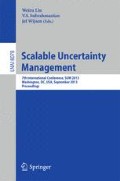Abstract
We address dynamics in abstract argumentation using a logical theory where an agent’s belief state consists of an argumentation framework (AF, for short) and a constraint that encodes the outcome the agent believes the AF should have. Dynamics enters in two ways: (1) the constraint is strengthened upon learning that the AF should have a certain outcome and (2) the AF is expanded upon learning about new arguments/attacks. A problem faced in this setting is that a constraint may be inconsistent with the AF’s outcome. We discuss two ways to address this problem: First, it is still possible to form consistent fallback beliefs, i.e., beliefs that are most plausible given the agent’s AF and constraint. Second, we show that it is always possible to find AF expansions to restore consistency. Our work combines various individual approaches in the literature on argumentation dynamics in a general setting.
Access this chapter
Tax calculation will be finalised at checkout
Purchases are for personal use only
Preview
Unable to display preview. Download preview PDF.
References
Dung, P.M.: On the acceptability of arguments and its fundamental role in nonmonotonic reasoning, logic programming and n-person games. Artif. Intell. 77(2), 321–358 (1995)
Baumann, R., Brewka, G.: Expanding argumentation frameworks: Enforcing and monotonicity results. In: Baroni, P., Cerutti, F., Giacomin, M., Simari, G.R. (eds.) COMMA. Frontiers in Artificial Intelligence and Applications, vol. 216, pp. 75–86. IOS Press (2010)
Cayrol, C., de Saint-Cyr, F., Lagasquie-Schiex, M.: Change in abstract argumentation frameworks: Adding an argument. Journal of Artificial Intelligence Research 38(1), 49–84 (2010)
Booth, R., Kaci, S., Rienstra, T., van der Torre, L.: Monotonic and non-monotonic inference for abstract argumentation. In: FLAIRS (2013)
Caminada, M.: On the issue of reinstatement in argumentation. In: Fisher, M., van der Hoek, W., Konev, B., Lisitsa, A. (eds.) JELIA 2006. LNCS (LNAI), vol. 4160, pp. 111–123. Springer, Heidelberg (2006)
Baroni, P., Caminada, M., Giacomin, M.: An introduction to argumentation semantics. Knowledge Eng. Review 26(4), 365–410 (2011)
Katsuno, H., Mendelzon, A.O.: Propositional knowledge base revision and minimal change. Artificial Intelligence 52(3), 263–294 (1991)
Alchourrón, C.E., Gärdenfors, P., Makinson, D.: On the logic of theory change: Partial meet contraction and revision functions. Journal of symbolic logic, 510–530 (1985)
Baumann, R.: What does it take to enforce an argument? Minimal change in abstract argumentation. In: Raedt, L.D., Bessière, C., Dubois, D., Doherty, P., Frasconi, P., Heintz, F., Lucas, P.J.F. (eds.) ECAI. Frontiers in Artificial Intelligence and Applications, vol. 242, pp. 127–132. IOS Press (2012)
Toni, F., Sergot, M.: Argumentation and answer set programming. In: Balduccini, M., Son, T.C. (eds.) Gelfond Festschrift. LNCS (LNAI), vol. 6565, pp. 164–180. Springer, Heidelberg (2011)
de la Banda, M.G., Pontelli, E. (eds.): ICLP 2008. LNCS, vol. 5366. Springer, Heidelberg (2008)
Egly, U., Gaggl, S.A., Woltran, S.: Answer-set programming encodings for argumentation frameworks. Argument and Computation 1(2), 147–177 (2010)
Gebser, M., Kaufmann, B., Kaminski, R., Ostrowski, M., Schaub, T., Schneider, M.: Potassco: The potsdam answer set solving collection. AI Communications 24(2), 107–124 (2011)
Liao, B.S., Jin, L., Koons, R.C.: Dynamics of argumentation systems: A division-based method. Artif. Intell. 175(11), 1790–1814 (2011)
Roos, N.: Preferential model and argumentation semantics. In: Proceedings of the 13th International Workshop on Non-Monotonic Reasoning, NMR 2010 (2010)
Gratie, C., Florea, A.M.: Argumentation semantics for agents. In: Cossentino, M., Kaisers, M., Tuyls, K., Weiss, G. (eds.) EUMAS 2011. LNCS, vol. 7541, pp. 129–144. Springer, Heidelberg (2012)
Boella, G., Gabbay, D.M., Perotti, A., van der Torre, L., Villata, S.: Conditional labelling for abstract argumentation. In: Modgil, S., Oren, N., Toni, F. (eds.) TAFA 2011. LNCS, vol. 7132, pp. 232–248. Springer, Heidelberg (2012)
Grossi, D.: On the logic of argumentation theory. In: van der Hoek, W., Kaminka, G.A., Lespérance, Y., Luck, M., Sen, S. (eds.) AAMAS, pp. 409–416. IFAAMAS (2010)
Schwarzentruber, F., Vesic, S., Rienstra, T.: Building an epistemic logic for argumentation. In: del Cerro, L.F., Herzig, A., Mengin, J. (eds.) JELIA 2012. LNCS, vol. 7519, pp. 359–371. Springer, Heidelberg (2012)
Besnard, P., Doutre, S.: Checking the acceptability of a set of arguments. In: Delgrande, J.P., Schaub, T. (eds.) NMR, pp. 59–64 (2004)
Boella, G., Hulstijn, J., van der Torre, L.W.N.: A logic of abstract argumentation. In: Parsons, S., Maudet, N., Moraitis, P., Rahwan, I. (eds.) ArgMAS 2005. LNCS (LNAI), vol. 4049, pp. 29–41. Springer, Heidelberg (2006)
Coste-Marquis, S., Devred, C., Marquis, P.: Constrained argumentation frameworks. In: Doherty, P., Mylopoulos, J., Welty, C.A. (eds.) KR, pp. 112–122. AAAI Press (2006)
Author information
Authors and Affiliations
Editor information
Editors and Affiliations
Rights and permissions
Copyright information
© 2013 Springer-Verlag Berlin Heidelberg
About this paper
Cite this paper
Booth, R., Kaci, S., Rienstra, T., van der Torre, L. (2013). A Logical Theory about Dynamics in Abstract Argumentation. In: Liu, W., Subrahmanian, V.S., Wijsen, J. (eds) Scalable Uncertainty Management. SUM 2013. Lecture Notes in Computer Science(), vol 8078. Springer, Berlin, Heidelberg. https://doi.org/10.1007/978-3-642-40381-1_12
Download citation
DOI: https://doi.org/10.1007/978-3-642-40381-1_12
Publisher Name: Springer, Berlin, Heidelberg
Print ISBN: 978-3-642-40380-4
Online ISBN: 978-3-642-40381-1
eBook Packages: Computer ScienceComputer Science (R0)

